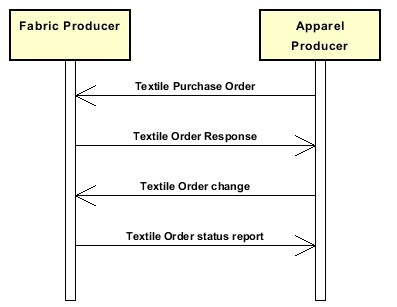- Solutions for business and system integration must be focused to large and small enterprises together.
- Integration requires the adoption of public and agreed standards for information exchange, they must be freely available to the firms of different countries.
- The proposed approach supports the direct peer-to-peer exchange between firms, center of services or mediators is allowed but is not a requirement.
- The integration between firms is built starting from a specific sectorial perspective.
- Building the Moda-ML framework the following choices have been done:
- Data exchanges are based on electronic documents (messagges) using XML. A different template of message for each different transaction (EDI using XML).
- Use of international terminology and coding (ISO, etc.) as much as possible.
- The XML documents are modular and human - readable (well structured and with understandable tag names), not only machine - readable (thus with large use of list of predefined values and few spaces for natural language and its ambiguity).
- Use of standard tools/languages of W3C to manipulate and validate the documents, based on XML Schema, X-Path, etc. Specific document templates are built for different business to reduce uncertainty and to make more constraining the automatic validation based on XML Schema

Sample of EDI/XML data exchange sequence
|


![[PREVIOUS]](/moda-ml/images/but_previous.gif)
![[NEXT]](/moda-ml/images/but_next.gif)
![[PRINT]](/moda-ml/images/but_print.gif)
![[PREVIOUS]](/moda-ml/images/but_previous.gif)
![[NEXT]](/moda-ml/images/but_next.gif)
![[PRINT]](/moda-ml/images/but_print.gif)


![[PREVIOUS]](/moda-ml/images/but_previous.gif)
![[NEXT]](/moda-ml/images/but_next.gif)
![[PRINT]](/moda-ml/images/but_print.gif)
![[PREVIOUS]](/moda-ml/images/but_previous.gif)
![[NEXT]](/moda-ml/images/but_next.gif)
![[PRINT]](/moda-ml/images/but_print.gif)